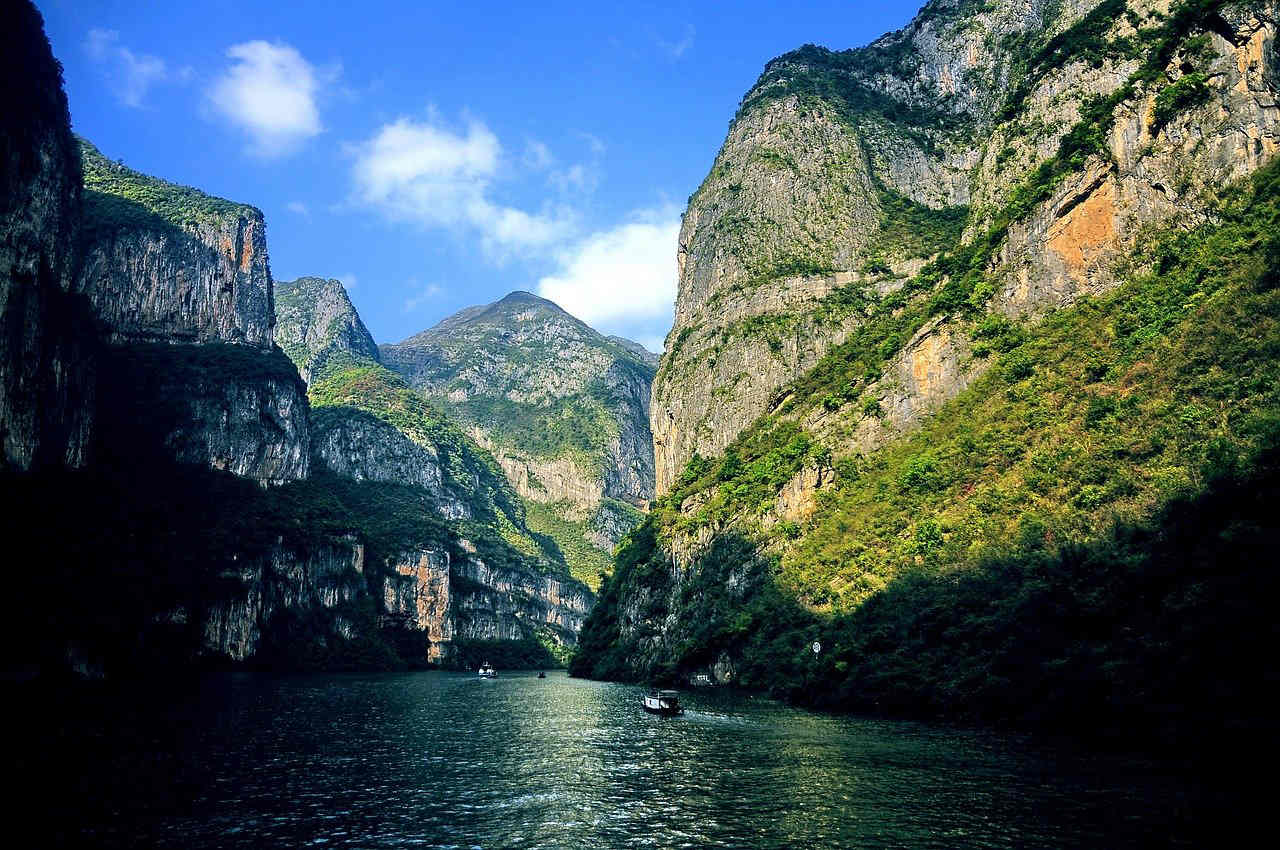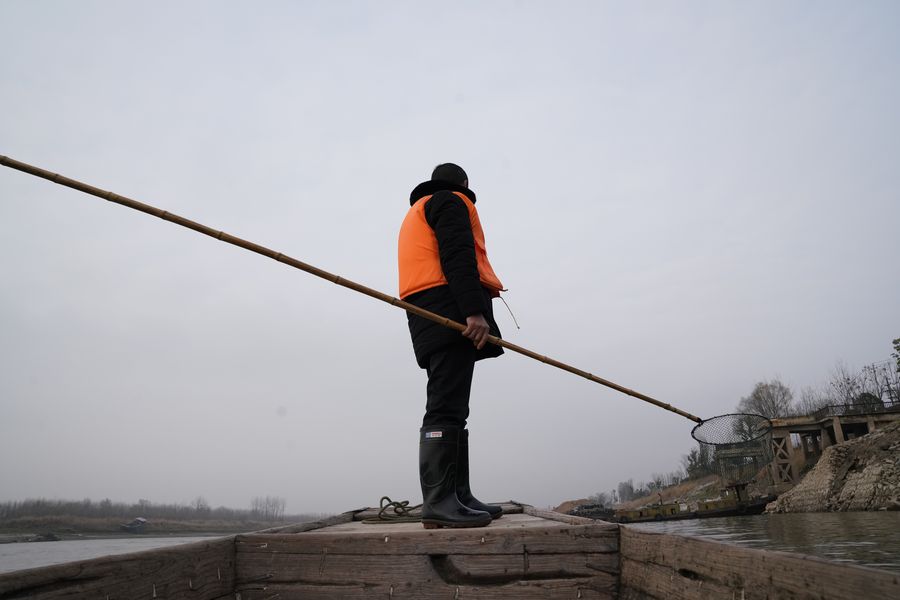


The Yangtze River is the world's third longest river, as well as China's mother river. [Photo by Pixabay]
From the ice-covered Tibetan plateau to the glittering delta on the East China Sea, the Yangtze River connects China’s magnificently disparate landscapes and culture, serving as the heart and soul of China. In his masterpiece Memorial to Yueyang Tower, Fan Zhongyan, a famous poet of the Song Dynasty (960-1279), described the beauty and vitality of the river: Fish with scales like glimmering silk disport themselves in the water, and the fishermen sing to each other for sheer joy.
A millennium later, the river, once pulsating with life, is now experiencing depleting biological resources and degrading biodiversity due to human activities such as overfishing and pollution.
To prevent the deterioration of the river’s ecological situation, an unprecedented 10-year fishing moratorium was issued in January, 2020, covering 332 conservation areas in the Yangtze River basin, which will expand to all the river’s natural waterways and its major tributaries from no later than Jan. 1, 2021.
On December 26, China passed a Yangtze River conservation law to provide legal basis for the river’s protection. With 96 provisions in nine chapters, the law is China’s first legislation on a specific river basin and will take effect on March 1, 2021.
“Though China has been imposing a yearly three-month fishing ban since 2003 to protect the river, the results are not promising. The new decade-long fishing ban is crucial and unprecedented, which can restore the river’s damaged ecological system, as well as promote sustainable use of natural resources,” said Cao Wenxuan, an academician of the Chinese Academy of Sciences.
The tragedy of Yangtze goddess

A stamp of Chinese paddlefish. In January, the Chinese paddlefish, one of the world’s largest freshwater fish species, a native of the Yangtze River system, has been declared extinct. (Photo by Chinadaily)
For thousands of years, Baiji (white-fin dolphin) was regarded as the goddess of protection by local fishermen and boatmen. The beautiful animal appeared in countless historical records and literature, worshiped by the Chinese for its elegance and beauty. However, over the past few decades, toxic waters, unsustainable fishing and collisions with shipping traffic have all sealed the Baiji’s fate. In 2007, the Baiji was declared functionally extinct.
Baiji is not the only animal that was eradicated from the river by human activities. In January, the Chinese paddlefish, one of the world’s largest freshwater fish species, a native of the Yangtze River system, has been declared extinct. Many of Baiji’s less-storied neighbors, such as the finless porpoise, are now facing the grave danger of extinction.
According to statistics, the Yangtze River is home to 424 types of fish, of which 183 are endemic, with the categories of freshwater fish in the river comprises 33 percent of the national total. Experts noted that there is not much time left to protect the river’s ecological system before more animals follow Baiji’s fate, causing great loss to China’s biodiversity.
“The extinction of the Baiji stung the collective conscience of the Chinese people. The remaining fish’s fate foreshadows the health of the whole river ecosystem, so the crisis is also our own," said Jiang Meng, secretary-general of the Nanjing Yangtze Finless Porpoise Conservation Association.

Citizens release fry voluntarily into the Yangtze River in Nanjing, capital of east China's Jiangsu Province, Nov. 15, 2019. (Nanjing Yangtze Finless Porpoise Conservation Association/Handout via Xinhua)
The alarming situation has made the environmental protection of the Yangtze River, rather than large-scale development, the dominant focus of China’s river development plans.
At a symposium on comprehensively advancing the development of the Yangtze River Economic Belt held in November, 2020, Chinese President Xi Jinping noted that the restoration of the ecological environment of the Yangtze River should be a major priority. He further added that the establishment of a mechanism should be accelerated whereby protection and restoration of the ecological environment shall be reasonably rewarded, while those responsible for the ecological environment destruction shall pay their due price.
According to statistics, since the new decade-long ban took effect in January, nearly 100,000 fishermen on 80,000 boats have given up their nets, while the full-scale ban is likely to affect more than 113,000 fishing boats and nearly 280,000 fishermen in 10 provincial regions along the river.
Local authorities along the river have also been launching new environmental-friendly policies to cope with the 10-year fishing ban. Jiangsu Province, in the lower reaches of the Yangtze, closed more than 6,000 chemical firms near the river in the last three years. Chongqing, lying upstream, aims to remove all companies which have dilapidated equipment from the river by 2020.
"Official clampdowns on overfishing and polluting activities have gradually restored the water quality of the Yangtze. The ban may not be very timely, but it can surely save the river," Jiang said.
Coexistence with the Yangtze

Ex-fisherman Zhu Changhong cleans floating trash as he patrols along the Yangtze River in east China's Anhui Province, on Jan. 6, 2020.(Xinhua/Qu Yan)
To most fishermen whose families have been working on the river for generations, the decade-long fishing ban have fundamentally changed their life, but for the better.
According to statistics, though being the world’s third longest river, the Yangtze now only produces 0.32 percent of China’s total freshwater aquatic products. For the past few years, annual catch from the Yangtze has fallen to less than 100,000 tonnes from more than 420,000 tonnes in 1950s.
"Fishermen were caught in a vicious circle -- the more they fish, the poorer they become because of the worsening environment," said Cao.
In December, Vice Premier Han Zheng said that the 10-year fishing ban is a long-lasting, arduous and complicated task, but underscored that it is also important to accelerate innovations in green development, fostering emerging industries while upgrading traditional ones.
The new fishing ban has provided fishermen with new opportunities. Local authorities have opened training courses on welding, computer operation and aquaculture for the ex-fishermen, helping them find new jobs in factories or start their own businesses. For those who don’t want to stay ashore, a new job, river patroller, was created for their needs.
Zheng Laigen, a 44-year-old fisherman from Tongling, eastern China’s Anhui Province, moved ashore after floating on a boat his entire life. Taking advantage of his expertise in aquatic products garnered over the years, he is now the owner of a fishing farm and manages about 13 hectares of ponds, raising crabs, shrimp and fish.
His new business was prosperous last year, with an annual income of about 300,000 yuan. In the peak season during the summer, he had to hire four people to help with his work.
Unlike Zheng, Zhu Changhong, who is also from Tongling, continues to live by the river with his wife in a different way.
With the help of the local government, the couple joined a patrol team to clean floating trash and report sightings of finless porpoises, a job that earns them 5,000 yuan a month (about $720). Instead of fishing on the river, now Zhu and his wife patrol 10 to 15 km of water per day on average, collecting up to 200 kg of trash on a busy day.

Undated file photo provided by the Nanjing Yangtze Finless Porpoise Conservation Association shows a Yangtze finless porpoise in the water. (Zhang Kun/Nanjing Yangtze Finless Porpoise Conservation Association/Handout via Xinhua)
According to Zhu, harmonious coexistence with the river has made him happy. He further noted that, thanks to China’s great effort to protect the Yangtze, the river is now recovering little by little, with more fish and birds seen along the river.
"It reminds me of my childhood when I see finless porpoises again during the patrol," Zhu said as quoted by Xinhua, "It's an honor to protect these angels of the Yangtze River."

 Award-winning photos show poverty reduction achievements in NE China's Jilin province
Award-winning photos show poverty reduction achievements in NE China's Jilin province People dance to greet advent of New Year in Ameiqituo Town, Guizhou
People dance to greet advent of New Year in Ameiqituo Town, Guizhou Fire brigade in Shanghai holds group wedding
Fire brigade in Shanghai holds group wedding Tourists enjoy ice sculptures in Datan Town, north China
Tourists enjoy ice sculptures in Datan Town, north China Sunset scenery of Dayan Pagoda in Xi'an
Sunset scenery of Dayan Pagoda in Xi'an Tourists have fun at scenic spot in Nanlong Town, NW China
Tourists have fun at scenic spot in Nanlong Town, NW China Harbin attracts tourists by making best use of ice in winter
Harbin attracts tourists by making best use of ice in winter In pics: FIS Alpine Ski Women's World Cup Slalom
In pics: FIS Alpine Ski Women's World Cup Slalom Black-necked cranes rest at reservoir in Lhunzhub County, Lhasa
Black-necked cranes rest at reservoir in Lhunzhub County, Lhasa China's FAST telescope will be available to foreign scientists in April
China's FAST telescope will be available to foreign scientists in April